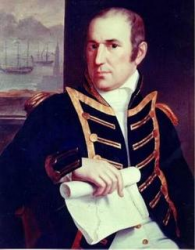
 |
|
|
||
|
Edward Preble |
||||
|
Engagements: • Revolutionary War (1775 - 1783)• Quasi-War (Franco-American War) (1798 - 1800)• 1st Barbary War (1801 - 1805) |
||||
| Biography: | ||||
|
Edward Preble Edward Preble was born on 15 August 1761 at Falmouth, eastern Massachusetts (now Portland, ME), the son of General Jedidiah Preble. As a boy, his home was destroyed in the burning of Falmouth by British Naval Commander Henry Mowatt. It is said that this action compelled Preble to join the Navy. It also contributed to his terrible temper later in life. In 1779, he was appointed to the Massachusetts State Navy, becoming an officer in the 26-gun ship Protector. Becoming a British prisoner when that ship was captured in 1781, he was held for a time in the prison ship New Jersey. On his release, he served in Winthrop and led a boarding party to capture a British brig at Castine, ME, and worked it out to sea despite heavy shore fire. United States Navy Service Fifteen years of merchant service followed his Revolutionary War service and, in April 1798, he was appointed First Lieutenant in the U.S. Navy. In January 1799, he assumed command of the 14-gun brig USS Pickering and took her to the West Indies to protect American commerce during the Quasi-War with France. Commissioned Captain on 7 June 1799, he took command of USS Essex in December and sailed in January 1800 for the Pacific to provide similar protective services for Americans engaged in the East Indies trade. Given command of the 3rd Squadron, with USS Constitution as his flagship, in 1803, he sailed for the Barbary Coast and by October had promoted a treaty with Morocco and established a blockade off Tripoli in the First Barbary War. Stephen Decatur, William Bainbridge, Charles Stewart, Isaac Hull, Thomas Macdonough, James Lawrence, and David Porter served under his command at Tripoli. While commanding in Tripoli, Preble masterminded the burning of the USS Philadelphia on 16 February 1804, preventing the impressive warship from falling into enemy hands. Had Tripoli gained the use of the Philadelphia, the entire blockade would have been wasted. Stephen Decatur and his younger brother, James Decatur, were involved in the actual operation. James Decatur was killed in the fighting later that year aboard one of the squadron's attack craft, described in Preble's 18 September 1804 letter to the Secretary of the Navy detailing battles from July until he handed over command to Commodore James Barron. Over the course of his career, Preble helped establish many of the modern Navy's rules and regulations. Described as a stern taskmaster, he kept high discipline upon the ships under his command. He also dictated that his ships be kept in a state of readiness for any action while under sail, something many U.S. naval officers at the time did not insist upon. Future sea captains such as Decatur, Lawrence, and Porter took his procedures to heart at a time when the U.S. Navy was highly unregulated. Many of Preble's procedures became doctrine after the establishment of an official U.S. Navy. The officers serving under him during his career also went on to become influential in the Navy Department after his death, and together they proudly wore the unofficial title of "Preble's Boys." (When Preble took over command he discovered that his oldest officer was 20 and the youngest 15 years old. He therefore grumbled the Secretary of the Navy had given him "just a pack of schoolboys.") Preble's Mediterranean cruise led directly to the U.S. government's firm anti-negotiation stance. Many Mediterranean states, including Tripoli, had been pirating American shipping vessels, ransoming the sailors, and demanding tribute to prevent future pirate attacks. The tribute rose after each successful payment, as did the brutality and boldness of the attacks. End of Career In September 1804, Commodore Preble requested relief due to a long time illness. He returned to the U.S. in February 1805 and became engaged in the comparably light duty of shipbuilding activities at Portland, ME. By Congressional resolution in March 1805, a gold medal was struck and presented to Commodore Preble for the "gallantry and good conduct" of himself and his squadron at Tripoli. President Jefferson offered him the Navy Department in 1806, but Preble declined appointment due to his poor health. Honors Six ships of the U.S. Navy have been named USS Preble Preble Hall at the U.S. Naval Academy Preble County in Ohio Fort Preble at Spring Point in South Portland, ME Preble Street in Portland, ME Preble Street in Bremerton, WA Preble Township, Minnesota Town of Preble, Cortland County, NY Preble, WI, a former town in Wisconsin, now part of the city of Green Bay Preble High School in Green Bay, WI Death and Burial Commodore Edward Preble died on 25 August 1807 in Portland, ME, of a gastrointestinal illness. He is buried at Evergreen Cemetery in Portland. |
||||
| Honoree ID: 2975 | Created by: MHOH | |||
Ribbons
Medals
Badges
Honoree Photos
 |  |  |
 |  |
 |


